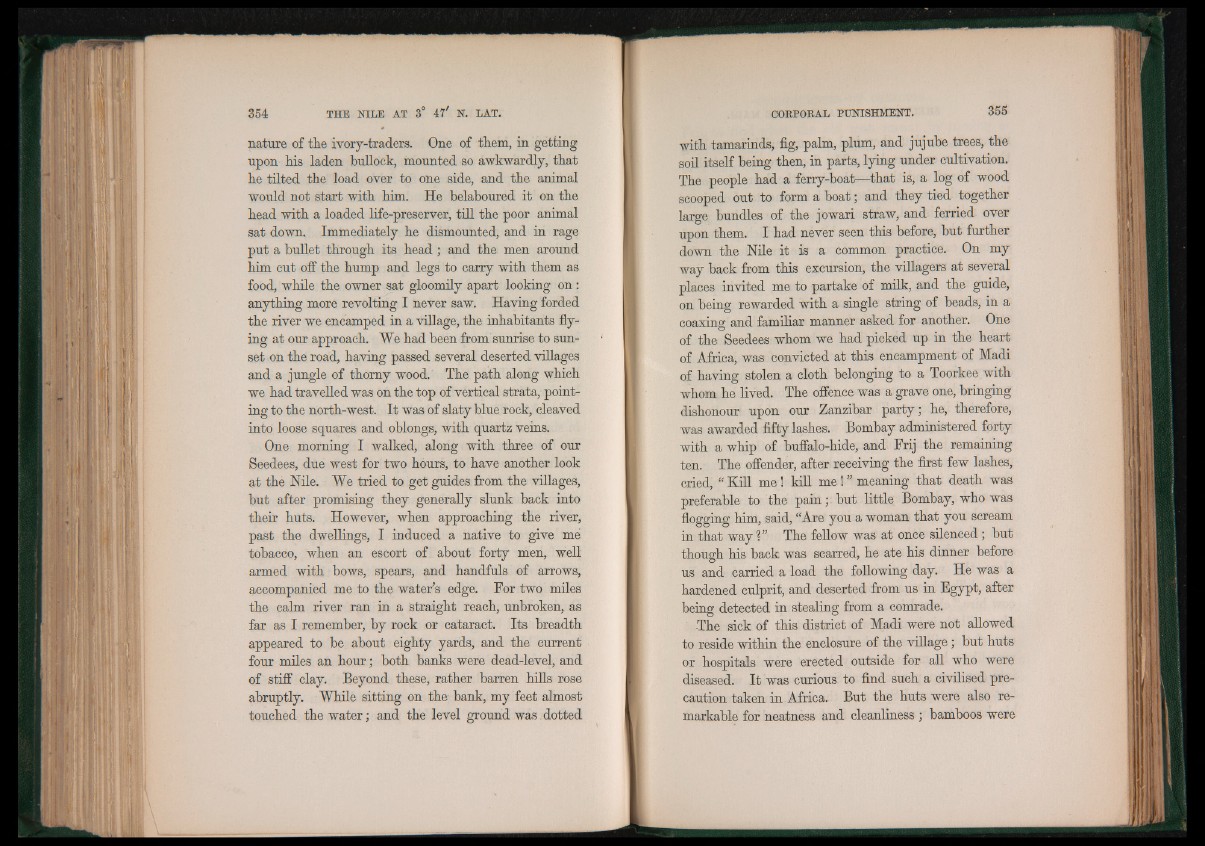
nature of the ivory-traders. One of them, in getting
upon his laden bullock, mounted so awkwardly, that
he tilted the load over to one side, and the animal
would not start with him. He belaboured it on the
head with a loaded life-preserver, till the poor animal
sat down. Immediately he dismounted, and in rage
put a bullet through its head; and the men around
him cut off the hump and legs to carry with them as
food, while the owner sat gloomily apart looking on :
anything more revolting I never saw. Having forded
the river we encamped in a village, the inhabitants flying
at our approach. We had been from sunrise to sunset
on the road, having passed several deserted villages
and a jungle of thorny wood. The path along which
we had travelled was on the top of vertical strata, pointing
to the north-west. It was of slaty blue rock, cleaved
into loose squares and oblongs, with quartz veins.
One morning I walked, along with three of our
Seedees, due west for two hours, to have another look
at the Nile. We tried to get guides from the villages,
but after promising they generally slunk back into
their huts. However, when approaching the river,
past the dwellings, I induced a native to give me
tobacco, when an escort of about forty men, well
armed with bows, spears, and handfuls of arrows,
accompanied me to the water’s edge. For two miles
the calm river ran in a Straight reach, unbroken, as
far as I remember, by rock or cataract. Its breadth
appeared to be about eighty yards, and the current
four miles an hour; both banks were dead-level, and
of stiff clay. Beyond these, rather barren hills rose
abruptly. While sitting on the bank, my feet almost
touched the water; and the level ground was dotted
with tamarinds, fig, palm, plum, and jujube trees, the
soil itself being then, in parts, lying under cultivation.
The people had a ferry-boat—that is, a log of wood
scooped out to form a boat; and they tied together
large bundles of the jowari straw, and ferried over
upon them. I had never seen this before, but further
down the Nile it is a common practice. On my
way back from this excursion, the villagers at several
places invited me to partake of milk, and the guide,
on being rewarded with a single string of beads, in a
coaxing and familiar manner asked for another. One
of the Seedees whom we had picked up in the heart
of Africa, was convicted at this encampment of Madi
of having stolen a cloth belonging to a Toorkee with
whom he lived. The offence was a grave one, bringing
dishonour upon our Zanzibar party; he, therefore,
was awarded fifty lashes. Bombay administered forty
with a whip of buffalo-hide, and Frij the remaining
ten. The offender, after receiving the first few lashes,
cried, “ F ill me ! kill me ! ” meaning that death was
preferable to the pain; but little Bombay, who was
flogging him, said, “Are you a woman that you scream
in that way ?” The fellow was at once silenced; but
though his back was scarred, he ate his dinner before
us and carried a load the following day. He was a
hardened culprit, and deserted from us in Egypt, after
being detected in stealing from a comrade.
-The sick of this district of Madi were not allowed
to reside within the enclosure of the village; but huts
or hospitals were erected outside for all who were
diseased. It was curious to find such a civilised precaution
taken in Africa. But the huts were also remarkable
for neatness and cleanliness ; bamboos were